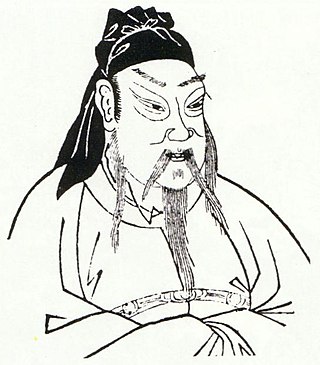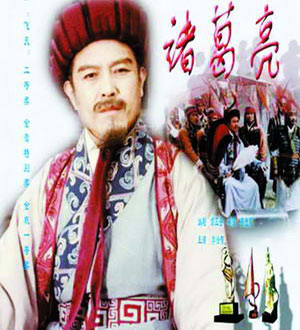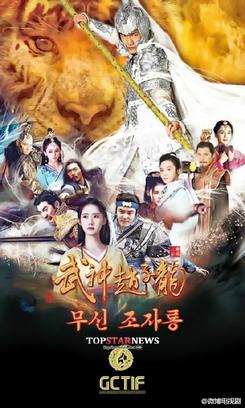Related Research Articles

Sun Quan,courtesy name Zhongmou (仲謀),posthumously known as Emperor Da of Wu,was the founder of Eastern Wu,one of the Three Kingdoms of China. He inherited control of the warlord regime established by his elder brother,Sun Ce,in 200. He declared formal independence and ruled from November 222 to May 229 as the King of Wu and from May 229 to May 252 as the Emperor of Wu. Unlike his rivals Cao Cao and Liu Bei,Sun Quan was much younger and governed his state mostly separate of politics and ideology. He is sometimes portrayed as neutral considering he adopted a flexible foreign policy between his two rivals with the goal of pursuing the greatest interests for the country.

Guan Yu,courtesy name Yunchang,was a Chinese military general serving under the warlord Liu Bei during the late Eastern Han dynasty of China. Along with Zhang Fei,he shared a brotherly relationship with Liu Bei and accompanied him on most of his early exploits. Guan Yu played a significant role in the events leading up to the end of the Han dynasty and the establishment of Liu Bei's state of Shu Han during the Three Kingdoms period. While he is remembered for his loyalty towards Liu Bei,he is also known for repaying Cao Cao's kindness by slaying Yan Liang,a general under Cao Cao's rival Yuan Shao,at the Battle of Boma. After Liu Bei gained control of Yi Province in 214,Guan Yu remained in Jing Province to govern and defend the area for about seven years. In 219,while he was away fighting Cao Cao's forces at the Battle of Fancheng,Liu Bei's ally Sun Quan broke the Sun–Liu alliance and sent his general LüMeng to conquer Liu Bei's territories in Jing Province. By the time Guan Yu learned about the loss of Jing Province after his defeat at Fancheng,it was too late. He was subsequently captured in an ambush by Sun Quan's forces and executed at Linju,Xiangyang Commandery.

Han (漢;221–263),known in historiography as Shu Han (蜀漢) or Ji Han (季漢"Junior Han"),or often shortened to Shu (Chinese:蜀;pinyin:Shǔ;Sichuanese Pinyin:Su2 <Middle Chinese:*źjowk <Eastern Han Chinese:*dźok),was a dynastic state of China and one of the three major states that competed for supremacy over China in the Three Kingdoms period. The state was based in the area around present-day Hanzhong,Sichuan,Chongqing,Yunnan,Guizhou,and north Guangxi,an area historically referred to as "Shu" based on the name of the past ancient kingdom of Shu,which also occupied this approximate geographical area. Its core territory also coincided with Liu Bang's Kingdom of Han,the precursor of the Han dynasty.

Zhang Fei,courtesy name Yide (益德),was a Chinese military general and politician serving under the warlord Liu Bei in the late Eastern Han dynasty and early Three Kingdoms period of China. Zhang Fei and Guan Yu,who were among the earliest to join Liu Bei,shared a brotherly relationship with their lord and accompanied him on most of his early exploits. Zhang Fei fought in various battles on Liu Bei's side,including the Red Cliffs campaign (208–209),takeover of Yi Province (212–214),and Hanzhong Campaign (217–218). He was assassinated by his subordinates in 221 after serving for only a few months in the state of Shu Han,which was founded by Liu Bei earlier that year.

Xu Shu,courtesy name Yuanzhi,originally named Xu Fu,was a Chinese politician of the state of Cao Wei during the Three Kingdoms period of China. He was born in the late Eastern Han dynasty and used to be a vigilante swordsman in his early life. However,after running into trouble with the authorities,he renounced his old ways and took up scholarly pursuits. He lived a reclusive life from the 190s to mid-200s in Jing Province,where he met and befriended Zhuge Liang. In late 207,he became an adviser to the warlord Liu Bei and served under Liu for about a year. He also recommended Zhuge Liang to Liu Bei during this period of time. In late 208,Liu Bei was defeated at the Battle of Changban by his rival Cao Cao. Xu Shu's mother was captured by Cao Cao's forces during the battle. Feeling lost and without a sense of direction,Xu Shu eventually left Liu Bei and joined Cao Cao. He continued serving in the state of Cao Wei –founded by Cao Cao's son and successor,Cao Pi,who ended the Eastern Han dynasty –and died of illness in office.

Dynasty Warriors 4 is a hack and slash video game and the fourth installment in the Dynasty Warriors series. Dynasty Warriors 4 was developed by Omega Force and published by Koei. The game is available on PlayStation 2 (PS2) and Xbox and is based on a series of books called Romance of the Three Kingdoms,written by Luo Guanzhong. As the series has progressed,it has strayed further from the actual plot of Romance of the Three Kingdoms but instead has given the user more input on how the storyline progresses. When it was released in Japan as Shin Sangokumusou 3,it topped the sales charts,sold over one million copies within nine days,and received an average of 78 out of 100 on Metacritics reviews.

Meng Huo was a local leader in the Nanzhong region in the state of Shu Han during the Three Kingdoms period of China. He was popularly depicted as a local leader representing the gentries of the Nanzhong region,but some historians doubt his historical existence.

Guan Xing,courtesy name Anguo,was an official of the state of Shu Han in the Three Kingdoms period of China.
Guan Suo is a fictional character of the Three Kingdoms period of China. He is often depicted as the third son of the general Guan Yu. He is not mentioned in historical records,and appears only in folk tales and in the historical novel Romance of the Three Kingdoms. He was said to have served in the state of Shu Han as a military general.

Zhang Bao was the eldest son of Zhang Fei,a general who served the warlord Liu Bei during the late Eastern Han dynasty and the state of Shu Han during the Three Kingdoms period of China. Little is known about Zhang Bao's life because Zhang Fei's biography in the historical text Records of the Three Kingdoms only mentioned that he was Zhang Fei's eldest son and that he died early.

Kessen II is a strategy game loosely based on the Three Kingdoms period of China. It is the sequel to Kessen in name only;both Kessen and the later sequel Kessen III are based on events in Japan and China. The gameplay involves playing out major battles as the storyline progresses,with cutscenes between each battle for the development of the events and major characters. Before battle,players are given a choice of strategies to take,although they can manually control all units in the battlefield. All units are controlled by the AI unless the player directly intervenes,and battles between forces are carried out in real-time. While in control of a unit,players are able to use special skills or magic spells to turn the tables,although enemy characters are also able to do so.

Sangokushi Kōmeiden is the second installment in the Sangokushi Eiketsuden tactical role-playing series developed by Koei.

Romance of the Three Kingdoms is a Chinese television series adapted from the classical 14th century novel of the same title by Luo Guanzhong. The series was produced by China Central Television (CCTV) and was first aired on the network in 1994. It spanned a total of 84 episodes,each approximately 45 minutes long. One of the most expensive television series produced at the time,the project cost 170 million yuan. It was completed over four years and involved over 400,000 cast and crew members,including divisions of the People's Liberation Army from the Beijing,Nanjing and Chengdu military regions. Some of the dialogue spoken by characters was adapted directly from the novel. Extensive battle scenes,such as the battles of Guandu,Red Cliffs and Xiaoting,were also live-acted.

The Battle of Bowang,also known as the Battle of Bowang Slope,was fought between the warlords Cao Cao and Liu Bei in 202 in the late Eastern Han dynasty.

Zhuge Liang is a Chinese television series based on the life of Zhuge Liang,a chancellor of the state of Shu Han in the Three Kingdoms period. The plot is based on stories about Zhuge Liang in the 14th-century historical novel Romance of the Three Kingdoms. The series starred Li Fazeng as the title character and was first aired on Hubei TV in mainland China in 1985. The show has been applauded for its historically accurate sets and costumes.

God of War,Zhao Yun,also known as Chinese Hero Zhao Zilong,released under the title Dynasty Warriors in Indonesia,is a 2016 Chinese television series directed by Cheng Lidong and produced by Zhejiang Yongle Entertainment Co.,Ltd. The series starred cast members from mainland China,South Korea and Taiwan:Lin Gengxin,Im Yoon-ah and Kim Jeong-hoon. The story is loosely adapted from the 14th-century Chinese classical novel Romance of the Three Kingdoms,with Zhao Yun as the main character. It was first aired on Hunan TV from 3 April to 7 May 2016.
Huaman (花鬘) is a fictional character who originated in "Dragon and Phoenix Headgear",a theatrical opera retelling Shu Han's conquest of Nanman during the Three Kingdoms period (220–280). She is portrayed as the daughter of Meng Huo,the king of the Southern Barbarians,and Lady Zhurong. She is described to be one of the wives of Guan Suo,a fictional son of Guan Yu.
References
- ↑ (in Chinese) 鲍三娘墓 (Bao Sanniang Tomb)
- ↑ McLaren, Anne Elizabeth (1998). Chinese Popular Culture and Ming Chantefables. BRILL. ISBN 9789004109988.
- ↑ Oman, Gail Kathryn (1982). A study of Hua Guan suo zhuan: a prosimetric narrative printed in 1478 (in Chinese). University of Chicago, Department of Far Eastern Languages and Civilizations.
- ↑ 花関索伝の研究 (in Japanese). 1989.